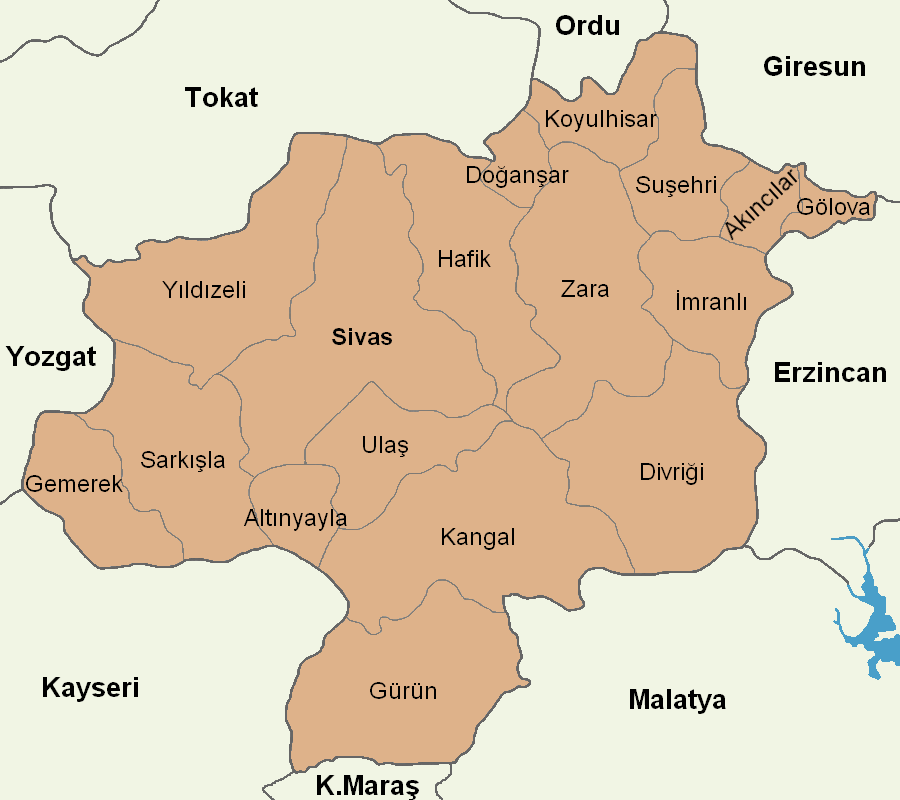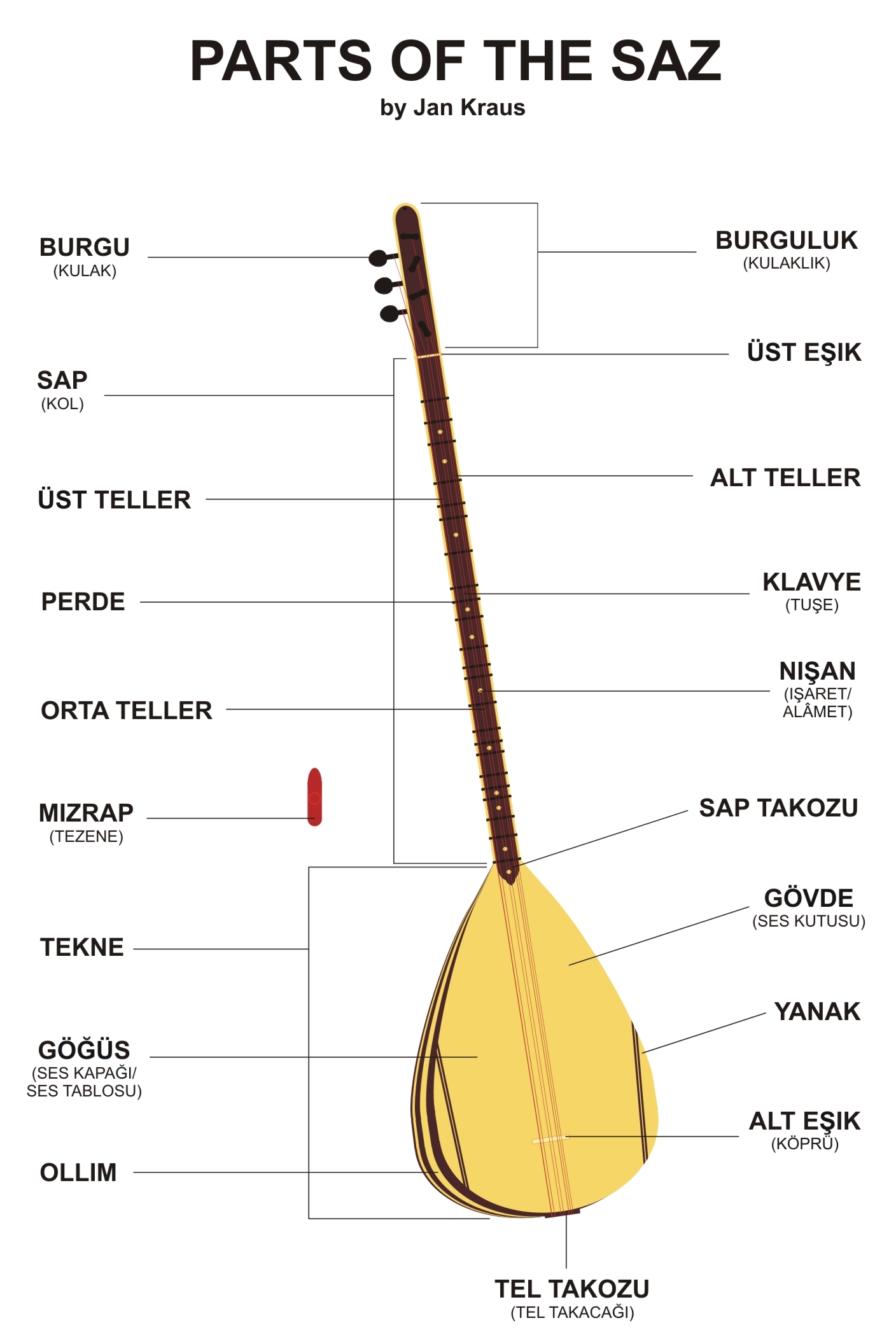|
Sivrialan
Sivrialan is a village in ÅarkÄąÅla, a district of Sivas Province, Turkey. It was known as SÃķbÞalan until 1928, when the name was changed so as to sound less 'foreign'. The village is located near the KÄązÄąlÄąrmak River, and is an Alevi village. Located in the Emlek region, which is prominent for its strong minstrel tradition, Sivrialan was historically home to many famous folk poets, or ashiks, of whom the most famous was ÃÅÄąk Veysel, the 20th century poet and baÄlama The baÄlama or saz is a family of plucked string instruments and long-necked lutes used in Europe, Balkans, Caucasus, Middle East, Khazar, Central Asia including Germany, France, Belgium, TRNC, Netherlands, Albania, Greece,Bosnia, Serbia, Croat ... (saz) player. Others included Fadime (19th century), Ali GÞç, HÄądÄąr GÞç, Veysel Kaymak, Bekir Sami Bozkurt, and Mehmet Ä°mran (early-late 20th century, Veysel's contemporaries, most of whom studied saz poetry from him). History The history of the ... [...More Info...] [...Related Items...] OR: [Wikipedia] [Google] [Baidu] |
ÃÅÄąk Veysel
ÃÅÄąk Veysel (Turkish: Help:IPA/Turkish, [aËËĘÉŊk vejËsÃĶl]; born Veysel ÅatÄąroÄlu (Turkish: Help:IPA/Turkish, [ĘaËËtÉŊÉū.oËÉŦu]); 25 October 1894 â 21 March 1973) was a Turkish people, Turkish Alevism, Alevi ashik, baÄlama virtuoso, and folk poet. He was born and died in the village of Sivrialan, Sivas Province, in the Ottoman Empire (later Turkey). Blind since the age of 7, Veysel's songs were typically melancholic, and dealt with a range of themes revolving around morality, love, faith, life and death, patriotism, nature, and his own perception of the world as a blind man. Veysel is considered one of the most prominent icons of Turkish folk music and Turkish folk literature, literature. Among his most popular folk songs are Uzun Ä°nce Bir YoldayÄąm (Turkish: ''I'm on a Long and Narrow Road''); "Black Earth" (''Kara Toprak''); "Let My Friends Remember Me" (''Dostlar Beni HatÄąrlasÄąn'') and "Your Beauty is Worth Nothing" (''GÞzelliÄin On Para Etmez''). In 2022, ... [...More Info...] [...Related Items...] OR: [Wikipedia] [Google] [Baidu] |
ÅarkÄąÅla District
ÅarkÄąÅla District is a Districts of Turkey, district of the Sivas Province of Turkey. Its seat is the town of ÅarkÄąÅla.Ä°lçe Belediyesi Turkey Civil Administration Departments Inventory. Retrieved 22 May 2023. Its area is 2,073 km2, and its population is 37,409 (2022). Composition There are three municipality, municipalities in ÅarkÄąÅla District: * Cemel * GÞrçayÄąr, ÅarkÄąÅla, GÞrçayÄąr * ÅarkÄąÅla There are 95 villages of Turkey, villages in ÅarkÄąÅla District:Turkey Civil Administration Departments Inventory. Retrieved 22 May 2023. [...More Info...] [...Related Items...] OR: [Wikipedia] [Google] [Baidu] |
ÅarkÄąÅla
ÅarkÄąÅla is a town in the Central Anatolian Sivas Province of Turkey. It is the seat of ÅarkÄąÅla District.Ä°lçe Belediyesi Turkey Civil Administration Departments Inventory. Retrieved 22 May 2023. Its population is 23,707 (2022). The mayor is Kasim GÞltekin (Great Unity Party, BBP). AÅÄąk Veysel, one of the most famous Turkish folk literature, Turkish folk poets and folk music singers of the 20th century were born in ÅarkÄąÅla, as well as another earlier poet (19th century) named AÅÄąk Sefil Kanberi. The well known Turkish originated female Dutch people, Dutch politician Nebahat Albayrak was born (1968) in Maksutlu village of this town as well. ÅarkÄąÅla has all the characteristics of Central Anatolian climate in all seasons. The weather is mostly sunny and dry, and the clouds are hi ... [...More Info...] [...Related Items...] OR: [Wikipedia] [Google] [Baidu] |
Sivas Province
Sivas Province () is a province of Turkey. It is located in the eastern part of the Central Anatolia region of Turkey. Its area is 28,164 km2 (the second largest province after Konya), and its population is 634,924 (2022). Its adjacent provinces are Yozgat to the west, Kayseri to the southwest, KahramanmaraÅ to the south, Malatya to the southeast, Erzincan to the east, Giresun to the northeast, and Ordu to the north. Its capital is Sivas. Most of Sivas Province has the typical continental climate of the Central Anatolian Region, in which summer months are hot and dry, while winter months are cold and snowy. However, the northern part of the province shows some features of the oceanic/ humid subtropical Black Sea climate, while the eastern portion has influences of the Eastern Anatolian highland climate. This province is noted for its thermal springs. Districts Sivas province is divided into 17 districts (capital district in bold): History The route of the Silk R ... [...More Info...] [...Related Items...] OR: [Wikipedia] [Google] [Baidu] |
KÄązÄąlÄąrmak River
The KÄązÄąlÄąrmak (, Turkish language, Turkish for "Red River"), once known as the Halys River () and Alis River, is the longest river flowing entirely within Turkey. It is a source of hydroelectric power and is not used for navigation. Geography The KÄązÄąlÄąrmak flows for a total of , rising in Eastern Anatolia around , flowing first to the west and southwest until , then forming a wide arch, the "Halys bend", flowing first to the west, then to the northwest, passing to the northeast of Lake Tuz (''Tuz GÃķlÞ'' in Turkish), then to the north and northeast, where it is joined by its major tributary, the Delice River (once known in Greek as the Cappadox river) at . After zigzagging to the northwest to the confluence with the Devrez River at , and back to the northeast, it joins the GÃķkÄąrmak (Sky ''River'' in Turkish) before finally flowing via a wide KÄązÄąlÄąrmak Delta, delta into the Black Sea northwest of Samsun at . Delta History The Hittites called the river the ... [...More Info...] [...Related Items...] OR: [Wikipedia] [Google] [Baidu] |
Alevism
Alevism (; ; ) is a syncretic heterodox Islamic tradition, whose adherents follow the mystical Islamic teachings of Haji Bektash Veli, who taught the teachings of the Twelve Imams, whilst incorporating some traditions from shamanism. Differing from Sunni Islam and Usuli Twelver Shia Islam, Alevis have no binding religious dogmas, and teachings are passed on by a ''dede'' "spiritual leader" as with Sufi orders. They acknowledge the six articles of faith of Islam, but may differ regarding their interpretation. They have faced significant institutional stigma from the Ottoman and later Turkish state and academia, being described as heterodox to contrast them with the "orthodox" Sunni majority. The term âAlevi-Bektashiâ is currently a widely and frequently used expression in the religious discourse of Turkey as an umbrella term for the two religious groups of Alevism and Bektashism. Adherents of Alevism are found primarily in Turkey and estimates of the percentage o ... [...More Info...] [...Related Items...] OR: [Wikipedia] [Google] [Baidu] |
Minstrel
A minstrel was an entertainer, initially in medieval Europe. The term originally described any type of entertainer such as a musician, juggler, acrobat, singer or fool; later, from the sixteenth century, it came to mean a specialist entertainer who sang songs and played musical instruments. Description Minstrels performed songs which told stories of distant places or of existing or imaginary historical events. Although minstrels created their own tales, often they would memorize and embellish the works of others. Frequently they were retained by royalty and high society. As the courts became more sophisticated, minstrels were eventually replaced at court by the troubadours, and many became wandering minstrels, performing in the streets; a decline in their popularity began in the late 15th century. Minstrels fed into later traditions of travelling entertainers, which continued to be moderately strong into the early 20th century, and which has some continuity in the form of ... [...More Info...] [...Related Items...] OR: [Wikipedia] [Google] [Baidu] |
Ashik
An ashik (; ) or ashugh (; ka, :ka:ááĻáĢáĶá, ááĻáĢáĶá) is traditionally a List of oral repositories, singer-poet and bard who accompanies his songâbe it a dastan (traditional epic story, also known as ''Azeri hikaye, hikaye'') or a shorter original compositionâwith a long-necked lute (usually a baÄlama or baÄlama, saz) in Music of Azerbaijan, Azerbaijani culture, including Music of Turkey, Turkish and Iranian Azeri, South Azerbaijani and non-Turkic cultures of Transcaucasia, South Caucasus (primarily Music of Armenia, Armenian and Music of Georgia (country), Georgian). In Azerbaijan, the Ashiqs of Azerbaijan, modern ashik is a professional musician who usually serves an apprenticeship, masters playing the baÄlama, and builds up a varied but individual repertoire of Turkic peoples, Turkic folk songs.Colin P. Mitchell (Editor), New Perspectives on Safavid Iran: Empire and Society, 2011, Routledge, 90â92 Etymology The word ''ashiq'' (, meaning "in love" ... [...More Info...] [...Related Items...] OR: [Wikipedia] [Google] [Baidu] |
BaÄlama
The baÄlama or saz is a family of plucked string instruments and long-necked lutes used in Europe, Balkans, Caucasus, Middle East, Khazar, Central Asia including Germany, France, Belgium, TRNC, Netherlands, Albania, Greece,Bosnia, Serbia, Croatia, Bulgaria, North Macedonia, Russia, Armenia, Azerbaijan, Turkmenistan, Uzbekistan, Kyrgyzstan, Iran, Iraq, Syria, Lebanon and Turkey. It is commonly used by Ashik, ashiks. Name According to ''The New Grove Dictionary of Music and Musicians'', "the terms 'baÄlama' and 'saz' are used somewhat interchangeably in Turkey. 'Saz' is generally used interchangeably with 'enstrÞman' (instrument) and it is used to refer single or group of musical instruments like 'Þflemeli sazlar' (Wind instrument, wind instruments). BaÄlama scale The scale (music), musical scale of the baÄlama differs from that of many western instruments â such as the guitar â in that it features ratios that are close to quarter tones. The traditional ratios for baÄla ... [...More Info...] [...Related Items...] OR: [Wikipedia] [Google] [Baidu] |
DivriÄi
DivriÄi (; ) is a town of eleven thousand people in Sivas Province, Turkey, and is the district capital of DivriÄi District.Ä°lçe Belediyesi Turkey Civil Administration Departments Inventory. Retrieved 22 May 2023. The town lies on a gentle slope on the south bank of the ÃaltÄąsuyu river, a tributary of the Karasu river which flows into the . The 13th century [...More Info...] [...Related Items...] OR: [Wikipedia] [Google] [Baidu] |




